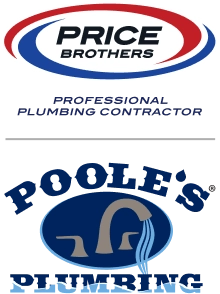Common Winter Plumbing Issues in North Carolina
Do pipes clog more in winter?
We'll cover some of the more common winter plumbing issues in North Carolina. When it comes time to do some winterizing around the house, many people focus on their yard and outdoor activities. But what many homeowners don't realize is that the winter months can cause severe damage to the inside of your home as well.
In particular, those who live in areas that experience freezing temperatures will need to be careful about how they approach their plumbing.
So, one of the most common issues in the winter months is damage to sewer lines, mainly due to the ice build-up around them. As it turns out, when water is exposed to freezing temperatures for an extended period, it forms crystals that expand over time. However, this usually doesn't cause too much trouble when they're too small to see.
But if they're large enough and form near a sewage line, these crystals can grow big enough to cause serious damage. They eventually puncture the sides of sewer lines, creating cracks that allow water – and all the icky stuff it carries with it – to flow back into your home, causing significant problems in the process.
So, we find that one of the best ways to prevent this is by heating your plumbing. If you've got a crawlspace, make sure the temperature of the ground in it stays above freezing during the winter months. If you've got any exposed pipes or outdoor faucets, make sure they are appropriately insulated against the cold weather as well.
Cracks
If low temperatures have caused issues in the past, you might also consider using insulation designed to reduce this kind of damage.
Of course, if your plumbing is already damaged, you're not out of luck. So, if the crack is smaller than an eighth of an inch, it can be fixed with epoxy resin. This fix has been around for more than a decade and is typically very successful.
However, if the crack is too large, the only real fix is to replace the entire sewer line – which can cost thousands of dollars – or have it repaired with a sleeve. This process involves removing the damaged portion of the pipe and inserting a new one in its place.
Frozen Pipes
Another common plumbing issue in the winter months is frozen pipes. This means the water is turned off throughout your home, but it can also lead to severe problems that your insurance probably won't cover.
Burst Pipes
The most severe of these is burst pipes. If water freezes and expands inside a line beyond its capacity, it will crack and break. The problem is that water can continue to drip out of this crack for several hours before you notice the damage.
By then, the pipe has already split in half, and much of your home's interior has likely been flooded with ice-cold water. You should call a trusted plumber right away to assess this situation's situation.
In most situations, the plumber will be able to fix the pipe and restore your home's plumbing to normal functionality in a short amount of time. But if it's genuinely damaged beyond repair, you'll need to call a restoration company and get ready for some significant work.
Depending on the extent of the damage, it can take 24 hours or more to dry out most flooded areas completely. And in some cases, you may need to replace floorboards, counters, and cabinets throughout your home before getting everything back in working order.
All told, this type of issue can easily cost tens of thousands of dollars in repairs, which is why it's so important to look for signs of trouble before it gets out of hand.
Most often, this may come in the form of condensation on windows and walls near where your home's plumbing system is located, so if you notice any of these signs, make sure to turn off water valves throughout your home (or known areas with exposed pipes) right away.
With everything turned off, go around and take a look at the ceilings and walls in your home for any signs of water damage. If you see any noticeable moisture on these surfaces, there's likely something wrong with your plumbing system that needs to be fixed right away.
Of course, frozen pipes are only one of several problems winter brings. If you've got drain clogs in your kitchen or bathroom, for instance, chances are they'll only get worse during colder months of the year.
The reason is simple: Drain cleaners lose their effectiveness when temperatures drop below freezing. Thus, if you want to keep them functional throughout winter, make sure you only use them on drains that are completely thawed and free of ice or snow.
Clogs, and clogged pipes
However, if you've got clogs in your sump pump, don't wait until they get worse – fix them right away. Left unrepaired, these clogs can cause the water around the outside of your home to freeze and expand. If enough pressure builds up behind this "frost heave," it can eventually cause the foundation to crack and leave your house needing significant repairs.
Many homeowners take this winter threat for granted, but it's a genuine possibility that can easily be avoided by simply clearing any debris from your sump pump's drainage system.
Another option for keeping clogs at bay is to connect a sump pump to a sewer line, which will give it a secondary way of getting rid of excess water. Of course, this is only necessary if you have an abnormally high level of moisture in your basement or crawlspace throughout the winter months.
Prevention
For most homeowners, the best thing is to keep drains and sewers relatively straightforward. This will ensure the water has a clear path down and out of your home, which may help protect both you and your home from the financial consequences that excess moisture brings.
In most cases, this means having a reliable schedule for getting rid of standing water in places where basements or crawlspaces tend to collect it. In some cases, this may involve bringing in a professional to give things a thorough cleaning.
For instance, most home restoration companies recommend cleaning basements and crawlspaces once every three months over the winter months. By ensuring your foundation stays relatively free of excess moisture, you can significantly reduce the risk of any problems that come with excessive water damage in these areas. If you're not sure where to begin when cleaning your crawlspace or basement, however, don't hesitate to check with a professional restoration company in your area. They'll be more than happy to inspect your space and give you advice on how best to keep things in good condition throughout the winter.
And remember: If you notice any signs of water damage, immediately shut off your plumbing system at the beginning of winter. This will prevent any problems from growing worse as you switch to using things like fireplaces and alternative heating systems during colder months of the year.
For far too many homeowners, winter means a lot more work – but that doesn't have to be the case. If you take the proper precautions now, you can save yourself a lot of trouble down the road. For more information, call Poole's Plumbing Services, the best plumbing service in Raleigh and the Triangle!
To contact the most trusted name in Raleigh plumbers, visit poolesplumbing.com.






